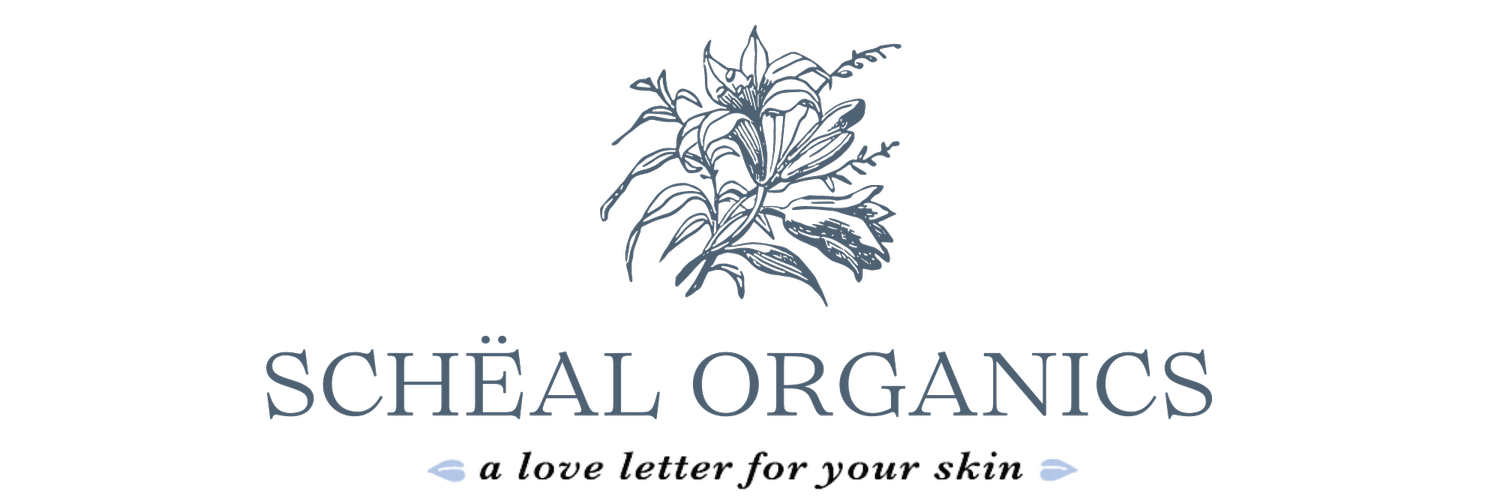
As the colder months descend upon us, it's time to shift our skincare routine to adapt to the changing dry season.
Our Winter BALM is packed with the nourishment the skin craves during these chilly days.
Love,
Christina

SKIN
FUGAZI
Welcome to the

Could it be that the products marketed to alleviate your skin concerns inadvertently exacerbate the very problems you seek to resolve, potentially exploiting your insecurities for profit?
Hi I’m Christina I’m here to help you learn and get you off the racket about the skincare hypes. Discover deep skin education that works, facts, and have transformational results.

SPF is it actually creating aging brown spots and hyperpigmentation?
-
ingredients
Titanium Dioxide or Zinc Oxide?
Titanium dioxide (TiO₂) and
zinc oxide (ZnO
Titanium dioxide (TiO₂) and zinc oxide (ZnO) are common ingredients in many organic sunscreens but not all minerals are good for you, like lead or mercury for example.
While these two ingredients do block harmful UV rays, their are other organic spf properties that act as an organic spf. When we use an overuse of spf we are blocking vitamin D creating a deficiency.
Vitamin D is vital foranti aging, bone health, muscle strength, immune function, and mood regulation.
There's been a shift in awareness regarding the safety of these ingredients. Micro-sized particles of zinc and titanium can interact with our skin at a cellular level, potentially causing oxidative stress. This stress can lead to premature aging and cellular damage. Additionally, recent studies show the safety of nanoparticle forms of these minerals penetrate the skin more easily and may enter the bloodstream.
Titanium dioxide (TiO₂) and zinc oxide (ZnO) nanoparticles can penetrate deeper into the skin, especially when the skin barrier is compromised, a condition often produced by the ingredients creating low vitamin D in the first place. This affect vital organs, such as the liver, which poses potential toxicity risks.
This is the kicker, TiO₂ and ZnO are triggered by UV light to produce reactive oxygen species (ROS). These molecules can damage DNA, proteins, and cell membranes, leading to oxidative stress, a key contributor to aging. This manifests as fine lines, wrinkles, and uneven skin tone.
Furthermore, the oxidative stress from these nanoparticles raises concerns over DNA integrity, which could increase the risk of cancer.
References 1. Sadrieh, N., et al. (2010). *Lack of Significant Dermal Penetration of Zinc Oxide from Sunscreen Formulations Containing Nano- and Larger-Size Zinc Oxide Particles.* *Toxicological Sciences*, 115(1), 156–166. 2. Baroli, B., et al. (2007). *Penetration of Metallic Nanoparticles in Human Full-Thickness Skin.* *Journal of Investigative Dermatology*, 127(7), 1701-1712. 3. Donaldson, K., et al. (2009). *Oxidative Stress and Nanoparticles: A Review.* *Nanotoxicology*, 3(3), 230-241. 4. Gulson, B., et al. (2010). *Small amounts of zinc from zinc oxide particles in sunscreens applied outdoors are absorbed through human skin.* *Toxicological Sciences*, 118(1), 140-149. 5. International Agency for Research on Cancer (IARC). (2010). *Titanium Dioxide.* IARC Monographs on the Evaluation of Carcinogenic Risks to Humans, 93.

D
A lack of Vitamin D can harm the skin's ability to heal and regenerate, leading to an uneven skin tone and increased dark spots. It affects melanocytes, which produce pigment, and can disrupt melanin production, causing uneven coloring. Vitamin D is vital for collagen production, keeping skin firm. We get organic Vitamin D from sunlight, which nourishes the body and the earth. Without enough Vitamin D, we may experience weak immunity, depression, and dry, irritated skin that ages quickly. It's essential to get some sun wisely, as too much exposure can be harmful.
BOTOX
is making my face
Atrophy?
-
1.
Muscle atrophy is a potential side effect of regular Botox injections, as the procedure may induce long
2. Skin Thinning: Repeated Botox use can cause the skin to become thinner. The muscle inactivity may lead to reduced skin support, making it more susceptible to wrinkles and sagging as it loses its firmness.
3. Skin Texture Changes:
Long-term Botox use can change the skin’s texture. Less muscle movement might make the
4. Altered Facial Expressions: Overuse of Botox can result in a diminished ability to make natural facial expressions, potentially leading to an unnatural or mask-like appearance.
5. Dependence on Treatments: Continuous use of Botox can lead to skin becoming reliant on the treatment for a smooth appearance. Once treatments are discontinued, the skin may show signs of accelerated aging due to the sudden return of muscle activity.
6. Potential for Muscle Imbalance: Long-term Botox use can disrupt the natural balance of facial muscles. This imbalance can cause asymmetry or other changes in facial structure.
Muscle atrophy is a potential side effect of regular Botox injections, as the procedure may induce long-term weakening of facial muscles. This weakening can result in a
Muscle atrophy is a potential side effect of regular Botox injections, as the procedure may induce long-term weakening of facial muscles. This weakening can result in a diminished range of natural expression, ultimately leading to an appearance that may seem stiff or unnatural.
Long-term Botox use can change the skin’s texture. Less muscle movement might make the skin less stretchy, resulting in uneven texture.
7. Reduced Natural Collagen Production: Botox may interfere with the natural production of collagen in the skin. Collagen is essential for maintaining skin elasticity and firmness, so its reduction can contribute to premature aging.
-
Facial Exercises:** Engaging in facial exercises can help strengthen the muscles that may have weakened due to prolonged Botox use. These exercises can improve muscle tone and support natural facial movements.
Skin Care Routine: is the consistency that brings the true transformation to the skin. Scheal the Lift Serum is a strong hyaluronic acid that plumps the skin by retaining moisture reducing wrinkles and fine lines. Followed by the Balm which is filled with nutrients that not only reverse damaged skin but smooth scarring.
Collagen-Stimulating Treatments: Facials are when you allow someone to help take care of your beautiful face. Procedures such as microneedling, microcurrent, or radiofrequency treatments can stimulate collagen production, which may help improve skin firmness and elasticity that might have been affected by Botox use.

Subcutaneous tissue and fat pads provide volume and contour that help maintain skin tightness by filling in the spaces under the skin. As we age these fat pads can shrink or shift which leads us to sagging skin. The subcutaneous layer is the connective tissue that supports the skin and allows it to move over the underlying muscles and bones this is the true healthy layer that gives us the overall tightness and elasticity of the skin.
Just like the foods we eat, SCHEAL ingredients are Gods gift from the earth that have havehealing properties, reverse aging, smooth scarring and reverse damage.
FILLER FACTS & FIXES
-
Fascia & Tendons are a type of connective tissue that wraps around the muscles and helps hold everything in place. When we freeze the tendons and fascia what strength would it have to hold any muscles together?
-
Fillers can cause unevenness, resulting in bumps beneath the skin and has the potential in causing tissue death. Fillers also don't desolve. Repeated injections may irritate and damage the skin to the underlying structures of the skin. Over time, this is what becomes a cycle of needing more which can lead to increased sagging skin.
-
Facial massage can boost blood circulation and encourage lymphatic drainage, which helps maintain the condition of facial fat pads. Engaging in targeted facial exercises, such as cheek lifts or jawline exercises, can strengthen and tone the muscles, enhancing the appearance of these fat pads. For instance, at night using the Lift Balm use the wrist part of your hand to firmly massage in outward motions at night can stimulate the fat beneath the skin and promote lymphatic drainage from the face.

SKIN FOOD
-
Here is a list of Foods that are the best to help reverse aging and High in Collagen-Boosting Nutrients
Bone Broth
- Rich in collagen, which directly supplies your body with the building blocks it needs to produce more collagen.
Citrus Fruits
- High in Vitamin C, which is essential for collagen synthesis.
- Includes oranges, lemons, limes, grapefruits.
Berries
- Contain high levels of Vitamin C and antioxidants that protect skin and promote collagen production.
- Includes strawberries, blueberries, raspberries.
Garlic- Contains sulfur, which helps to synthesize and prevent the breakdown of collagen.
Egg Whites
- Rich in proline, an amino acid critical for collagen production.
Leafy Greens
- High in Vitamin C and antioxidants that stimulate collagen production.
- Includes spinach, kale, Swiss chard.
Tomatoes
- Rich in lycopene, which protects against collagen breakdown and encourages production.
Olive Oil
High in healthy fats for the skin's overall health
Bell Peppers
- High in Vitamin C and antioxidants.
Avocados
- Packed with Vitamin E, which protects against collagen damage.
Carrots
- High in Vitamin A, which restores damaged collagen.
Soy Products
- Contains genistein, an isoflavone that stimulates collagen production and blocks enzymes that degrade skin.
Nuts & Seeds
- Rich in Vitamin E and Omega-3 fatty acids, which protect collagen from damage.
- Includes almonds, chia seeds, flaxseeds, walnuts.
Fish (Especially Fatty Fish)
- High in Omega-3 fatty acids, which protect the skin's collagen.
- Includes salmon, mackerel, sardines.
Bone-in Meats
- Contains collagen in the connective tissues, which is beneficial when consumed.
Beans
- High in proteins and amino acids that support collagen synthesis.
Pumpkin Seeds
- Rich in zinc, which plays a critical role in collagen production.
Oysters
- High in zinc, which is essential for collagen formation.
Dark Chocolate (70% or Higher Cocoa
- Contains antioxidants that protect against collagen breakdown.
Pineapple
- Contains bromelain, which supports skin elasticity and collagen production.
Kiwi
- Rich in Vitamin C, which is crucial for collagen synthesis.
Papaya
- High in Vitamin C and lycopene.
Broccoli
- Rich in Vitamin C and other antioxidants that support collagen production.
Cabbage
- Contains antioxidants and vitamins that promote collagen production.
Mushrooms- High in zinc, which supports collagen synthesis
Pomegranate
- Rich in antioxidants and ellagic acid, which protects collagen and boosts its production.
Aloe Vera
- Known to increase collagen production when consumed.
Green Tea
- Contains catechins, which protect against collagen breakdown and boost production.
Turmeric
- Contains curcumin, which promotes collagen synthesis and prevents its breakdown
Honey
- Natural humectant and contains antioxidants that support collagen production.
Cucumber
- Contains silica, which is essential for collagen formation.
Turmeric & Ginger
Contains curcumin, anti inflammatory compound helps circulation
-
Collagen Peptides adding collagen to your diet will increase your production.
Lysine
Proline
Glutamine
Arginine
Tyrosine
Omega 3
These are all found in organic pastured raised eggs and meat products that contain a high protein but are also sold as a supplement. Check out recommended products page
Foods that STOP the aging process?
SMILE it’s a work-out
Our face is the expression of who we are. Our face has many muscles that help us make the expressions, like smiling or laughing. When these muscles are strong and toned, they support the skin better but when we weaken the muscles the skin does not have the support it once had and will begin to sag.
Let’s get the skin more collagen and elasticity!
Subscribe
Subscribe
While I may not have doctor in my title, as a licensed esthetician with over thirty years of skincare wisdom, I promise to share my tried-and-true tips with the same passion minus the white coat. These are my common-sense personal opinions and practical advice, not medical advice. Always if you need consult with a healthcare professional for medical concerns.If you have a question or would like more information about a subject concerning your skin, say hello in the form below




